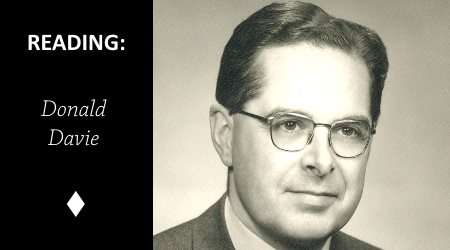Donald Davie (1922-1995) was a rather philosophical poet and scholar. His decisively English style is strong and confident and has been likened to Larkin and Hughes. I read ‘A spring song’:
“stooped to truth and moralized his song”
Spring pricks a little. I get out the maps.
Time to demoralize my song, high time.
Vernal a little. Primavera. First
Green, first truth and last.
High time, high time.A high old time we had of it last summer?
I overstate. But getting out the maps…
Look! Up the valley of the Brenne,
Louise de la Vallière… Syntax collapses.
High time for that, high time.To Château-Renault, the tannery town whose marquis
Rooke and James Butler whipped in Vigo Bay
Or so the song says, an amoral song
Like Ronsard’s where we go today
Perhaps, perhaps tomorrow.
Tomorrow and tomorrow and… Get well!Philip’s black-sailed familiar, avaunt
Or some word as ridiculous, the whole
Diction kit begins to fall apart.
High time it did, high time.High time and a long time yet, my love!
Get out that blessed map.
Ageing, you take your glasses off to read it.
Stooping to truth, we potter to Montoire.
High time, my love. High time and a long time yet.
Here the spring, the vernal primavera, is portrayed as Nietzsche’s ‘großer Mittag’, although Davie’s demoralizing is not identical with Nietzsches overcoming of morality. The spring gives us first truth and last, it appears to me that the poet is advocating ‘living in the moment’ in a more eloquent way. The syntax of the complex French names doesn’t matter and the map that he is trying to get out remains hidden even in the last stanza, where it receives a blessing because it promises some sort of structure even after the whole ‘diction kit’ has begun to fall apart.
When you (I assume the poet’s life partner) finally reads it she has to take her glasses off because her eyes don’t accommodate well to the nearness. It doesn’t matter: They potter (move about aimlessly) to Montoire, a place in central France. I didn’t look up the other geographical place names to decode a message because I think there is none (I don’t like poetry that codifies a message in names).
I like this kind of poetry as a secular version of the biblical song of songs, a tribute to worthy ageing and passing on with your head high, though it seems you stooped to truth.
